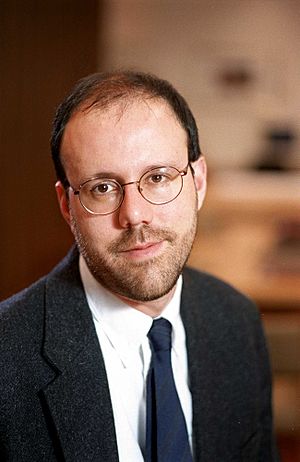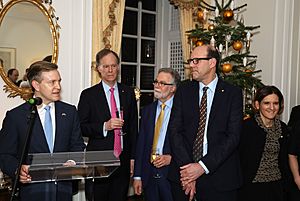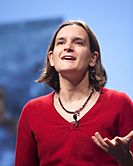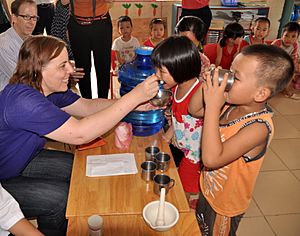Michael Kremer facts for kids
Quick facts for kids
Michael Kremer
|
|
|---|---|

Kremer in 2020
|
|
| Born |
Michael Robert Kremer
November 12, 1964 New York City, U.S.
|
| Spouse(s) | Rachel Glennerster |
| Institutions | |
| Field | Development economics Health economics |
| Alma mater |
|
| Doctoral advisor |
Robert Barro • Eric Maskin • Greg Mankiw |
| Doctoral students |
Edward Miguel • Seema Jayachandran • Karthik Muralidharan • Nava Ashraf • Benjamin Olken • Dina Pomeranz • Emily Oster • Asim Ijaz Khwaja |
| Contributions | O-ring theory of economic development • Randomized controlled trials |
| Awards | Nobel Prize in Economics (2019) MacArthur Fellowship (1997) |
| Information at IDEAS / RePEc | |
Michael Robert Kremer (born November 12, 1964) is an American development economist. He studies how to help countries grow and reduce poverty. Currently, he is a professor at the University of Chicago. He also leads the Development Innovation Lab there.
In 2019, Michael Kremer won the Nobel Memorial Prize in Economic Sciences. He shared the award with Esther Duflo and Abhijit Banerjee. They were recognized for their new ways of testing ideas to fight poverty around the world.
Kremer also helped start the Bureau for Research and Economic Analysis of Development (BREAD). This group supports research on development. He is also a member of the National Academy of Sciences.
Contents
Early Life and Education
Michael Robert Kremer was born in New York City on November 12, 1964. His parents were both professors at Kansas State University. His father taught architecture, and his mother taught English.
Michael went to Manhattan High School in Kansas. He started taking college classes in fifth grade. By his junior year of high school, he had enough credits to be a college sophomore.
He left high school a year early to attend Harvard University. He earned his first degree in Social Studies in 1985. His senior paper compared programs in India and Sri Lanka that helped people find jobs or get food.
Helping Others in Kenya
After Harvard, Kremer taught and worked in a school in Kenya for a year. This experience inspired him greatly. He then helped create WorldTeach, a non-profit group. WorldTeach focuses on education and development around the world. He is still the President of its Board today.
After Kenya, Kremer returned to Harvard University. He earned his PhD in Economics in 1992. His research looked at what helps economies grow over a long time.
Michael Kremer is married to Rachel Glennerster. She is also an economist and works to help global development.
Career and Contributions
Kremer began his teaching career at the Massachusetts Institute of Technology (MIT) in 1992. He later joined Harvard University in 1999. From 2003 to 2020, he was the Gates Professor of Developing Societies there. After Harvard, he moved to the University of Chicago.
He is a respected member of several important groups. These include the Econometric Society and the National Academy of Sciences.
Kremer is known as one of the most influential economists globally. His work focuses on economic growth and reducing poverty. He especially looks at how education and health can help.
Testing Ideas with Experiments
Along with Abhijit Banerjee and Esther Duflo, Kremer helped show how useful randomized controlled trials (RCTs) are. RCTs are like scientific experiments. They test if a program or idea really helps fight poverty. Duflo said Kremer was "a visionary" for using these experimental methods early on.
Fighting Worms to Help Kids Learn
One of Kremer's most famous studies looked at deworming programs in schools. He worked with Edward Miguel on this. They found that giving children medicine to treat worms greatly improved their health and school attendance. Kids missed 25% fewer school days!
This success led to the Deworm the World Initiative. Since 2014, this program has given over 1.8 billion deworming treatments to children worldwide. It is considered one of the best charities for its impact. Kremer is also part of Giving What We Can. This group encourages people to donate a part of their income to effective charities.
Investing in New Solutions
In 2010, Kremer helped create Development Innovation Ventures (DIV). This program is run by USAID. It acts like a venture capital fund for development. It gives money to test new ideas for fighting poverty. If an idea works well, DIV helps it grow bigger. This program has funded many projects and created a lot of social good.
Kremer also co-founded Precision Development (PxD). This non-profit uses text messages to give farmers in Kenya agricultural advice. This simple idea helped farmers increase their crop yields. PxD now helps millions of users around the world.
Vaccines and Health Innovation
Kremer has also researched how to develop and pay for vaccines. He and his wife, Rachel Glennerster, suggested "advance market commitments" (AMCs). These are agreements where governments promise to buy vaccines if they meet certain safety and effectiveness standards. This encourages companies to develop new vaccines.
This idea led to a $1.5 billion AMC for pneumococcal vaccines. This helped create three new vaccines that have protected 150 million children.
Kremer's research was also important during the COVID-19 pandemic. He advised the U.S. government on Operation Warp Speed. This program helped speed up the development of COVID-19 vaccines.
Key Research Areas
Kremer's research focuses on how economies grow and how to reduce poverty. He often looks at health and education. He is a strong supporter of using randomized controlled trials (RCTs) in development economics. This work earned him the Nobel Prize in 2019.
The O-Ring Theory
One of Kremer's early ideas is the O-ring theory of economic development. He named it after the Space Shuttle Challenger disaster. That disaster happened because one small part failed. Kremer's idea is that in complex tasks, every step needs to be done correctly for the whole thing to work.
This means that highly skilled workers often need other highly skilled workers to succeed. So, skilled workers earn more in places where other workers are also skilled. This theory helps explain why some countries have more skilled workers and higher wages.
Population Growth and Ideas
Kremer also studied how population growth affects new ideas and technology. He found that societies with more people often had faster improvements in technology. This is because more people mean more ideas can be created and shared.
Protecting Endangered Species
Kremer has also looked at how to protect endangered animals. He suggested that governments could store ivory. If elephant populations dropped too low, they could release some ivory onto the market. This would lower the price and make poaching less appealing. This idea aims to reduce the incentive for poachers to kill endangered elephants.
Helping Children with Deworming
One of Kremer's most well-known studies is about deworming treatments for children. After his PhD, he visited Kenya. There, he helped set up a deworming program for elementary school children. He suggested giving the treatments in a random order. This allowed them to study the effects carefully, like in a medical trial.
The study found that deworming greatly improved children's health and school attendance. It reduced school absences by 25%. This success led to the Deworm the World Initiative. This program has provided billions of deworming treatments to children worldwide.
Later research showed that children who received deworming treatments for a few extra years earned 14% more money ten years later. They were also more likely to live in cities and work in better-paying jobs.
Tackling Absenteeism in Public Services
Kremer has also studied why public workers, like teachers and health workers, are often absent in developing countries. His research in India found that about 25% of public school teachers were absent. In some areas, it was as high as 42%. This costs a lot of money each year.
He and his co-authors found that health worker absenteeism was even higher, averaging 35% across several countries. This research has led to new ideas to solve the problem, like using cameras to monitor attendance.
Encouraging New Medicines
Kremer and Rachel Glennerster have strongly supported advance market commitments (AMCs). These are agreements where governments promise to buy a certain amount of a vaccine or medicine if it meets specific safety and effectiveness standards. This encourages drug companies to invest in developing new treatments.
Kremer's work showed that AMCs can help solve a problem where drug companies might not develop new medicines because they are unsure if they will be able to sell them at a good price later. AMCs have been suggested for many industries, including carbon removal and renewable energy.
Recognition and Awards
Michael Kremer is one of the most frequently cited development economists. This means his work is often referenced by other researchers.
Nobel Memorial Prize in Economics

In 2019, Kremer, Esther Duflo, and Abhijit Banerjee won the Nobel Memorial Prize in Economic Sciences. They were honored for their "experimental approach to alleviating global poverty." The Nobel committee noted that their methods, using randomized controlled trials (RCTs), now "entirely dominate development economics."
Edward Miguel, a professor at Berkeley, said that Kremer's work made it normal for economists to spend time in the countries they study. Amartya Sen, another Nobel Prize winner, praised Kremer for combining economic theory with real-world data to solve important problems.
Kremer, Duflo, and Banerjee donated their prize money to the Weiss Fund for Research in Development Economics. This fund supports new research in the field. Kremer said they wanted to invest the prize in a way that helps the entire development economics community.
Other Awards and Honors
- David A. Wells Prize for Best Economics Dissertation (1992)
- Presidential Early Career Award for Scientists and Engineers (1996)
- MacArthur Fellowship (1997)
- Fellow of the American Academy of Arts and Sciences (2003)
- Fellow of the Econometric Society (2008)
- Member, National Academy of Sciences (2020)
Images for kids
See also
 In Spanish: Michael Kremer para niños
In Spanish: Michael Kremer para niños
- List of Jewish Nobel laureates
 | Aaron Henry |
 | T. R. M. Howard |
 | Jesse Jackson |






